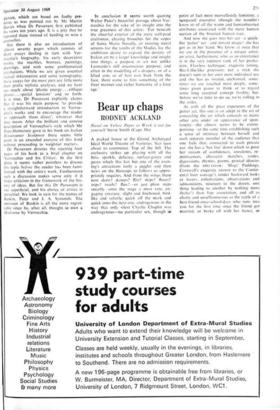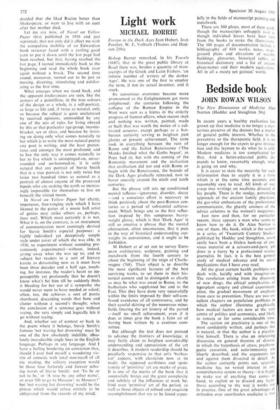Bear up chaps
RODNEY ACKLAND
Novel on Yellow Paper or Work it out for yourself Stevie Smith (Cape 30s) A packed house at the Grand Archetypal Ideal World Theatre of Varieties. Star turn about to commence. Top of the bill. The orchestra strikes up. playing with all the brio, sparkle, delicacy, surface-gaiety and gusto which this last but one of the even- ing's attractions (only a juggler and then news on the Bioscope to follow) so appro- priately requires. And from the wings there now darts? dances? flits? skips? floats? trips? twirls? flies?—or just plain steps smartly—onto the stage a most rare, en- gaging creature, slight and fineboned, bird- like and volatile, quick off the mark and quick onto the next one, androgynous in the way that only silent Charlie Chaplin was androgynous—no particular sex, though in
point of fact most marvellously feminine, a nonpareil exemplar (though she wouldn't know it) of all the warm and humanhearted attributes associated with the more human section of the bisected human race.
And now she goes into her act—a quick- fire 'patter' act—and instant magic! she has got us in her hand. We know at once that we are in the presence of a unique artist; an artist, furthermore, who as an entertainer is in the very topmost rank of her profes- sion. Flawless technique; exquisite timing, Bea-Lillie-like precision; not a trick she doesn't turn to her own most individual use and she has us riveted, enchanted: some- times we are touched most deeply, some- times given pause to think or to regard some long accepted concept freshly, but, before we've time to do so, we're rolling in the aisles.
As with all the great exponents of the patter act, this one is an adept in the art of concealing the art which conceals so many other arts under an appearance of spon- taneity—she almost seems to be extem- porising—at the same time establishing such a sense of intimacy between herself and each separate member of the audience that one feels that, connected to each private ear, she has a 'hot line' down which to pour her stream of confidences, anecdotes, re- miniscences, character sketches, asides, digressions, rhymes, poems, printed idiocies (from the sPEc-rmoit: 'Hogs' Puddings, Cornwall's exquisite answer to the Contin- ental liver sausage'), tender backward looks at lovers, exhortations, observations and admonitions, nineteen to the dozen, one thing leading to another by nothing more (haha!) than free association, and all as chatty and unselfconscious as the rattle of a best-friend-since-school-days who runs into you for the first time since the friend got married, or broke off with her fiancé, or
decided that she liked Racine better than Shakespeare, or went to live with an aunt after her mother died.
Let me say now, of Novel on Yellow Paper (first published in 1936 and just reprinted), that not only did it affect me with the compulsive inability of an Edwardian book reviewer faced with a rattling good yarn to put it down until the last page had been reached, but that, having reached the last page, I turned immediately back to the beginning and read the whole book over again without a break. The second time round, moreover, turned out to be just as moving, diverting, stimulating and exhilar- ating as the first time.
What emerges when we stand back, and the apparent irrelevancies are seen, like the pointes of a pointilliste, in the true colours of the design as a whole, is a self-portrait, as large as life and, if twice as natural, only so because the subject is quite uncluttered by received opinions, unmoulded by any one of the sets of rules for living obeyed by this or that particular age-group, income- bracket, sex or class, and because by insist- ing on doing only what comes naturally to her which is to write the most natural poetry any poet is writing, and the least preten- tious and amongst the most profound, and to live the only way it comes naturally to her to live which is unimpinged-on, unsur- rounded and un-hemmed-in, it is only natural that any portrait of Stevie Smith that is a true portrait is not only twice but twice two hundred times as natural as a portrait of almost anyone of the processed bipeds who are making the earth so increas- ingly impossible for themselves to live on beneath the visited moon.
In Novel on Yellow Paper her chatty, impetuous, free-ranging style which I have likened to the patter of a music hall artist of genius may strike others as, perhaps, faux naïf. Which most certainly it is not. What it is, on the contrary, is an instrument of communication most cunningly devised for Stevie Smith's especial purposes: a highly individual yet deceptively simple style under cover of which she was able, in 1936, to experiment without sounding pre- tentiously experimental—without, indeed, giving away what she was up to; and to subject her readers to a sort of literary karate as devastating now as it must have been three decades and a half ago, touch- ing, for instance, the reader's heart so imp perceptibly yet profoundly that he doesn't know what's hit him till he suddenly finds it bleeding for her out of a sympathy she would never seem to have needed or asked; often, too, she achieves a sort of poetic shorthand, discarding words that bore and clutter without a second's thought; when the conclusion of a sentence goes without saying, she very simply and logically lets it go without saying.
And, whether out of context or back in the poem where it belongs, Stevie Smith's famous 'not waving but drowning' must be one of the few absolutely indelible, abso- lutely ineradicable single lines in the English language. Perhaps in any language. And I have a feeling bordering on conviction that, should I ever find myself a wandering vic- tim of amnesia with total non-recall of all my reading, the solitary exception would be those four forlornly and forever echo- ing words of Stevie Smith: not `To be or not to be,' or 'A rose by any other name', or even 'Oh to go to Moscow! to Moscow!' but 'not waving but drowning' would be the phrase which would refuse entirely to be obliterated from the records of my mind:



































 Previous page
Previous page